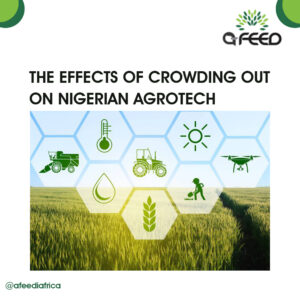In recent years, a growing number of agritech companies have begun offering digital solutions to address the challenges faced by smallholder farmers in Nigeria. These solutions aim to improve smallholder farmers’ access to financial services, farm inputs (e.g. as good quality seeds), fertilisers, insecticides and pesticides, and equipment (e.g. tractors), as well as provide other extension services to farmers.

Many agritech solutions improve farming methods and introduce best practices, while monitoring farmers’ progress from the start of the farming season through to harvest. New digital tools are also enabling farmers to access markets by connecting them with produce buyers.
However, unlike the fintech and the energy sector that could leverage on its market size and attractiveness, agritech being unpredictable, has continued to attract low access to venture capital and private firms funding. This was not the case in the beginning. Firms are withdrawing because of the unpredictable nature of governmental regulations and the increased borrowing by the Government to raise public sector spending. For instance, the Debt Management Office (DMO) data showed that as of March 2021, the government had an accumulated debt of N17.06 trillion (using the N381 exchange rate) covering FGN bonds, Sukuk, green bonds and Euro bonds – representing a 173.2 percent increase in debt from 2015.
These have consistently increased lending rate, crowded out private investment and negatively impacted the productivity of farmers, sustainability of agriculture and the growth of agritech in Nigeria.
Also, Since mid-2020, a flurry of regulatory activity has put the Nigerian tech ecosystem on the defensive as many startups grow silently with spooking investors both at home and abroad. This is because of the level of volatility, uncertainty, complexity and ambiguity of the current tech business environment in Nigeria.
When the government borrows to finance its spending, it competes with private entrepreneurs who are borrowing to finance their own activities. Capital used by the government is capital that cannot be used by private businesses. Moreover, when the government borrows, competition in the market for loanable funds increases, raising the price of borrowing, or the interest rate, for private investors. For firms, this means an increase in the cost of doing business. Companies and projects that would have otherwise been profitable are no longer able to be so at the higher interest rate.
Our position is clear. The multiplier-effects of increased government spending dominate the economy. For sustainable economic growth and development; Government must do less, not more. To encourage entrepreneurship, the administration should focus on reducing regulatory barriers for startups, enhancing competition and giving firms the best access to innovation through slashes of tariffs on products.
References
GSMA AgriTech Programme (2020). AgriTech in Nigeria Investment opportunities and challenges.
Abiodun Akanbi, Government Domestic Borrowing and Private Sector Credit Crowding out: Empirical Evidence from Nigeria, Journal of Investment and Management.
https://www.mercatus.org/publications/regulation/long-run-we%E2%80%99re-all-crowded-out
